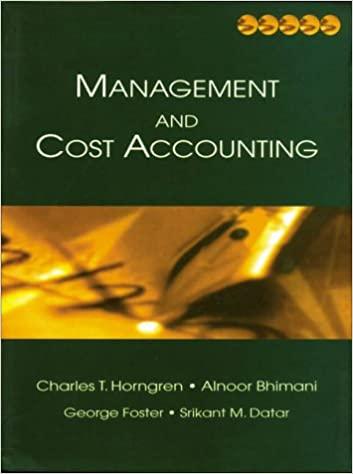Question
Tasty Time Cafeteria operates cafeteria food services in public buildings in the Midwest. Tasty Time is contemplating a major change in its cost structure. Currently,
Tasty Time Cafeteria operates cafeteria food services in public buildings in the Midwest. Tasty Time is contemplating a major change in its cost structure. Currently, all of their cafeteria lines are staffed with hourly wage employees who hand serve the food to customers. Benson Riggs, Tasty Times owner, is considering replacing the employees with an automated self-service system. However, before making the change, Benson would like to know the consequences of the change, since the volume of business varies significantly from location to location. Shown below are the CVP income statements for each alternative.
| Personal Service System | Automated Self-Service System | |||
| Sales | $2,030,000 | $2,030,000 | ||
| Variable costs | 1,522,500 | 1,015,000 | ||
| Contribution margin | $507,500 | $1,015,000 | ||
| Fixed costs | 101,500 | 609,000 | ||
| Net Income | $406,000 | $406,000 |
A) Using the margin of safety ratio, determine which alternative could sustain the greater decline in sales before operating at a loss. (Round answers to 2 decimal places, e.g. 0.25.)
| Personal Service System | Automated Self-Service System | |||
| Margin of safety ratio |
|
B)Tasty Times vice president of finance has offered another option. He suggests a different system that combines personal service at key points in the cafeteria line with a less expensive automated self -service system for the other items. The financial information on this system is given below:
| Blended Service System | ||
| Sales | $2,030,000 | |
| Variable costs | 1,218,000 | |
| Contribution margin | $812,000 | |
| Fixed costs | 406,000 | |
| Net Income | $406,000 |
Determine the degree of operating leverage for this option. (Round answer to 2 decimal places, e.g. 15.25.)
| Operating leverage |
C) How much would net income increase if sales increased by $203,000? (Round answer to 2 decimal places, e.g. 15.25%.)
| Net income | % |
D)
Using the margin of safety ratio, how large of a decline in sales could this option sustain before operating at a loss. (Round margin of safety ratio to 2 decimal places, e.g. 0.25.)
| Margin of safety ratio | ||
| Decline in sales | % |
Step by Step Solution
There are 3 Steps involved in it
Step: 1

Get Instant Access to Expert-Tailored Solutions
See step-by-step solutions with expert insights and AI powered tools for academic success
Step: 2

Step: 3

Ace Your Homework with AI
Get the answers you need in no time with our AI-driven, step-by-step assistance
Get Started


